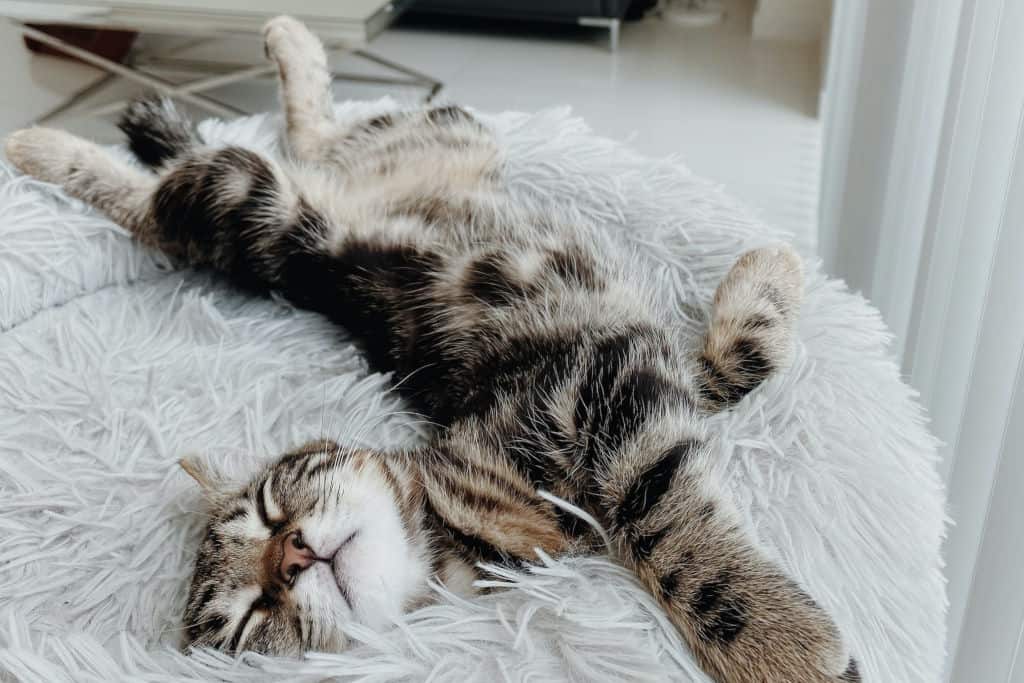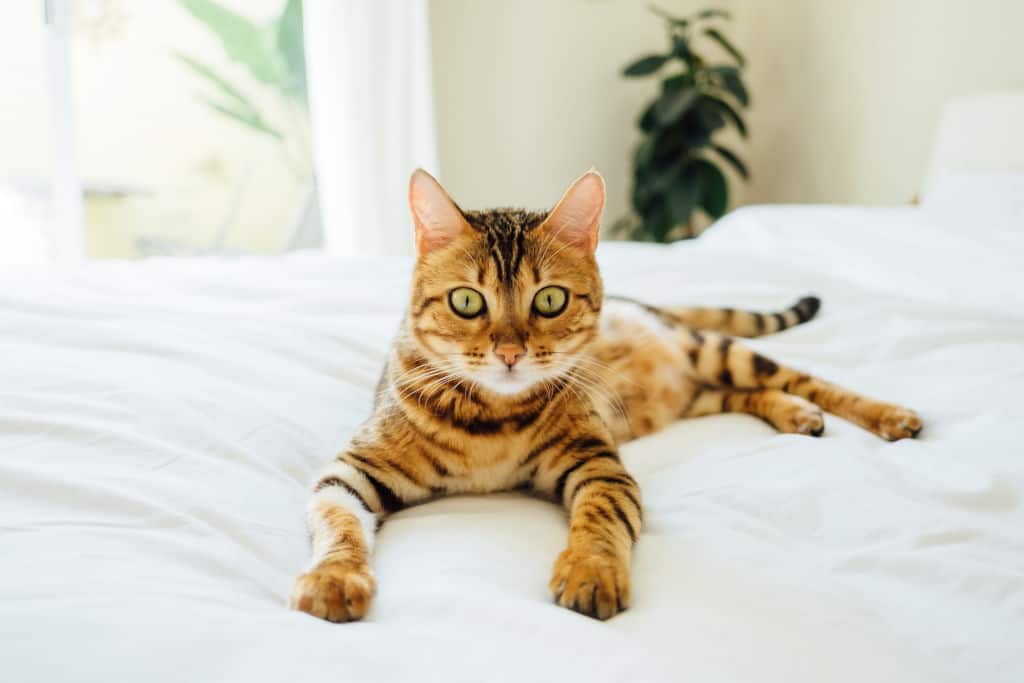Cats don’t just “take over” the dog’s bed; they believe they own it. The dog? Well, they’re mere tenants, operating on the cat’s whimsical terms.
Sure, that might be a bit tongue-in-cheek, but there’s a kernel of truth there. Let’s dive deeper into this feline mystery.
Interestingly, this behavior extends to their relationship with dogs. For instance, some cat owners often wonder, “why do my cat and dog sleep together?” The dynamic is fascinating. Cats and dogs, historically seen as adversaries, sometimes form bonds so close that they prefer each other’s company even during sleep.

Why Do Cats Lay in Dog Beds
Cats are unquestionably experts at choosing a comfy spot, and as far as I know, the only territorial claims they recognize are those of other cats.
Cats don’t know the concept of ownership and belonging. For a cat, things are there to be used as needed. There is also an intrinsic feeling that whatever is on offer, the cat will choose the best option as the best fit for them.
While a cat isn’t typically physically stronger than a dog, their assertiveness often prevails. They’re not really “stealing” the bed; in their minds, they’re selecting the prime real estate, especially if it’s snug and well-situated.
This might also explain why so many cat owners find their felines curling up with them at night. The common query, “why do cats like to sleep with their owners?” gets to the heart of the matter. These creatures are simply seeking warmth, comfort, and perhaps a sense of security they associate with their human caregivers.
Do Cats Actually Like Dog Beds?
Cats can and will sleep anywhere they like. I’m sure a cat wouldn’t know the difference between a cat bed and a dog bed, or in any case, would probably choose to fight for it.
Cats don’t understand hierarchy because it’s hard to grasp if you’ve never experienced it.
The cat does not think about ownership regarding humans, dogs, or other animals. It’s a bed, comfy, possibly heated from warmth, and it may have a pleasant texture, making it a good option for a cat.
Should You Buy a Different Cat Bed?
Cats adore laying on anything comfortable, including cat beds. Cats can’t resist hiding places so you can get one of the available cat houses. Most cats love these, and your friend will enjoy the warmth offered by these fantastic cat beds.
Cats can sleep in almost any place and appear entirely content. They’ll sleep almost anywhere they choose and switch it up now and then for variety.
To further understand this behavior, it’s crucial to realize the underlying dynamics between cats and other animals in the house. For instance, the bond between cats and dogs is intricate. Sometimes, if the cat feels threatened or uneasy, they might seek refuge in their own bed or space. But on more comfortable days, they don’t mind sharing or even taking over the dog’s bed. Such nuances in behavior reveal the cat’s unique way of asserting itself, marking territory, and also seeking companionship.
The bottom line, cats will choose where to sleep, and you shouldn’t force them to favor a particular location. If everything else fails, try sprinkling some catnip oil over the bed.
Suggested Reading: Why Do Cats Sleep Together?
Should Cats Sleep With You Instead of in Their Own Beds?

It’s a question many ponder upon, especially when they notice their cats cozying up with their canine pals. If cats can bridge the age-old gap and snuggle with dogs, is it such a stretch for them to prefer human beds over their own?
Allowing your cat to sleep with you may seem like a great idea (and we have a full guide here), but you should ask yourself some questions first.
First, you must consider the size of your bed. If you sleep in a small bed, a cat may need more room to sleep with you.
Do not cuddle with your cat if they exhibit any signs of disease, such as hair loss, skin rashes, sneezing, coughing, lethargy, vomiting, or diarrhea, to mention a few. Always have your pet checked as prescribed by your vet to assess your pet’s overall health state and to ensure they remain disease-free.
Many cats enjoy playing and may scratch or bite at human feet that move about under the covers.
However, many cat owners report significant mental health benefits from co-sleeping with their cats, emphasizing how their kitty helps them sleep more soundly.
Remember, cats are crepuscular rather than nocturnal. They are active during dawn and dusk. They will adjust to sleeping at the same time as you. Kittens will be hyper and keep you awake, but they can be tired out with activity and a meal before bed.
Cats are pretty vulnerable while resting and like to find a location or person they trust and enjoy lying with. They are proving their trust in you by sleeping with you. But they also want to stay warm. As a result, they enjoy sleeping with us because they use humans for body heat.
In the end, it all depends on the cat. Some kittens will be highly active and will not want to sleep through the night, disrupting your sleeping schedule. Older, more calm cats will most likely sleep with you all night.
The Unique Dynamic Between Cats and Dogs When Sleeping
Cats and dogs have vastly different sleep habits. Understanding these can make co-sleeping smoother for both.
- Depth of Sleep. Dogs enter REM sleep just like humans, twitching or even barking in their dreams. Cats, however, sleep more lightly. If you notice your cat’s ears twitching while they nap beside your dog, they’re staying alert, even in slumber.
- Body Language. A dog sprawled out on his back is in deep relaxation, maybe even inviting belly rubs. For a cat, this position might be a defensive posture. Understanding these subtle cues helps ensure both pets are comfortable.
- Sleep Duration. Cats need more sleep, clocking in 12-16 hours a day. Dogs average about 12. If your cat seems to be napping more often, don’t be alarmed. It’s just their way.
- Safety First. Both animals might seek out co-sleeping for safety, but their definitions of safety differ. Dogs often seek out packs, while cats seek out high or covered places. If your cat is choosing the floor with the dog over a high perch, it’s likely they feel safer with their canine friend.
Pro-tip: If you’re introducing a new pet, monitor their sleep interactions closely. Set up separate sleeping spaces initially. Over time, you might find them choosing each other’s company over solitude.
FAQ
Why Do Some Cats Choose a Different Spot and Not a Cat Bed?
Cats change their sleeping quarters regularly because it’s their instinct to keep themselves safe from predators by moving constantly. Additionally, mood, comfort, claiming territory, and avoiding changes like new noises or odors are all likely factors.
My cat has its bed but prefers the dog’s. Why?
Cats, like people, can build friendships with dogs at times once they are accustomed to each other’s presence and body language. The cat and dog sometimes sleep together for company, warmth, and comfort.
Why does my cat pee in my dog’s bed?
It may have to do with territory. Your cat is not doing it out of spite. Your dog likely peed on the bed at some point, and the cat is marking over it because it can smell it. If you don’t eliminate the odor, your cat will continue peeing in your dog’s bed.
Alex, a passionate animal lover, has experience in training and understanding animal behavior. As a proud pet parent to two dogs and three cats, he founded AnimalReport.net to share insights from animal experts and expand his knowledge of the animal kingdom.




